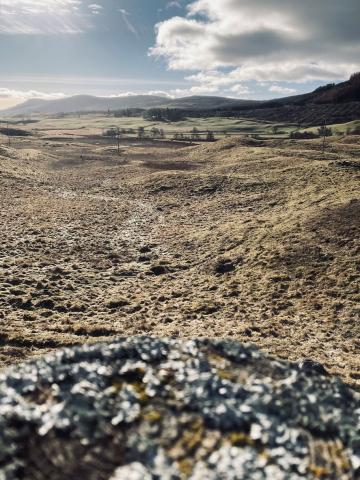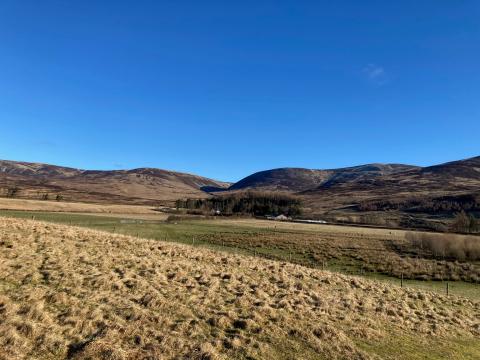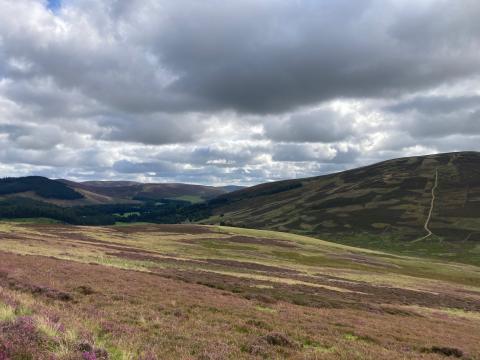An Angus environmental project aimed at transforming the biodiversity, climate resilience and ecology of the River South Esk and its catchment has been granted more than £1.4m from the Scottish Government’s Nature Restoration Fund, managed by NatureScot.
The funding will provide significant support in the coming years for the dedicated efforts of the River South Esk Catchment Partnership (RSECP) as they work to restore the River South Esk and ensure its future as a nature rich and climate resilient catchment.
RSECP’s project will restore the river and its habitats in numerous ways, including riverside tree planting, wetland creation and protecting the hill and mountain environments to nature’s benefit. It will simultaneously strengthen the area’s resilience to environmental challenges set by the changing climate.
The project will also provide new opportunities for communities to engage with nature, participate in its restoration and enjoy biodiversity in the Angus foothills and easternmost parts of the Cairngorms National Park.
Welcoming the grant award, Dr Roger Owen, RSECP’s Independent Chair and former Head of Ecology at SEPA, said: “The impact of climate change on the use and management of land is becoming ever clearer. Centuries of habitat fragmentation across the River South Esk Catchment has made our native flora and fauna vulnerable and unable to thrive in many areas.
“Through our work to transform the River South Esk and its catchment we want to set the standard for this type of work – restoring and creating rich natural habitats that are ecologically connected from hilltop to riverbed. We greatly appreciate NatureScot for their support in achieving this.”
The River South Esk Catchment Partnership (RSECP) is a broad and cross sector collective. The core partners delivering the project are Forestry and Land Scotland, Esk Rivers and Fisheries Trust and RSPB Scotland, supported by Angus Council, Tayside Biodiversity Partnership, and Cairngorms National Park Authority. The project could not be delivered without the continued contribution and support of landowners at Rottal Estate, Airlie Estates and Clova Estate.
Everyone involved is committed to delivering priorities that are consistent with the Tayside Local Biodiversity Action Plan 2016-26
Grant Moir, Chief Executive Officer at the Cairngorms National Park Authority, said: “Our river catchments run through the heart of communities within the Cairngorms National Park and are essential to tackling the climate and nature crises, creating habitat for endangered species like salmon and reducing the impacts of floods and droughts.
“Restored, healthy rivers are great examples of how nature can provide some of the solutions and help us adapt to a changing environment. This funding will be crucial in restoring the River South Esk for the benefit of people and nature.
“This closely aligns with the work we’re doing through the Cairngorms 2030 programme, which will see us restore and enhance three iconic rivers in the National Park: the Spey, Dee and Esk.”
Restoration work is already underway and positive change for environment and biodiversity being delivered as highlighted last year last year when RSECP attracted national recognition in winning the UK River Prize 2023.
The project is and will continue to deliver river restoration on River South Esk using large woody structures and the re-meandering of March Burn; as well as the creation of wetlands, native treeline woodland and riparian woodland; and the montane health protection.
Angus Council’s spokesperson for the Environment, Cllr Serena Cowdy said: “This is an incredibly exciting project with immediate and long-term benefits for Angus and its people. It will be marvellous to witness the transformative effect it has through the creation of landscape scale nature networks and the restoration of watercourses and heavily managed land to their natural states.
“We can all welcome RSECP’s ambitions to mitigate the impacts of climate change by restoring watercourse and floodplain function, and I look forward to seeing the rewards of increased habitat and species diversity that nature-based approaches to managing key ecosystems will bring.”
NatureScot Chair, Professor Colin Galbraith said: “Through the Nature Restoration Fund, we can support vital work to restore Scotland’s species and habitats back to being healthy, vibrant and thriving.
“Now more than ever, we need nature-based solutions to the climate-nature crises. It’s projects like this that can really help to stop biodiversity loss and enable us to move towards a nature-rich, net-zero future for everyone in Scotland.”
NatureScot is Scotland’s nature agency. They work to enhance our natural environment in Scotland and inspire everyone to care more about it. Their priority is a nature-rich future for Scotland and an effective response to the climate emergency. For more information visit their website at www.nature.scot or follow them on X (formerly Twitter) at https://twitter.com/naturescot
The Scottish Government’s £65m Nature Restoration Fund helps to restore species and habitats, protect our marine and coastal areas, and eradicate invasive, non-native species, as well as improving the health and wellbeing of local communities. The projects it supports are taking practical steps to help against the twin crises of climate change and biodiversity loss and restore Scotland’s natural environment.
River South Esk Catchment Partnership brings together all users of the catchment and, through consultation, they identify and agree upon the main environmental, social and economic issues affecting the catchment area. This then allows them to develop aims and actions to guide the future management of activities in the area in a sustainable way.
Esk Rivers and Fisheries Trustis a charitable organisation that raises funds to undertake habitat improvement works within the district. The work of the trust is to promote best practice and improve the health of aquatic ecosystems. In recent years, the trust has focused on habitat improvement projects, and is an active member of the RSECP.
Forestry and Land Scotland (FLS) manages forests and land owned by Scottish Ministers in a way that supports and enables economically sustainable forestry; conserves and enhances the environment; delivers benefits for people and nature; and supports Scottish Ministers in their stewardship of Scotland's national forests and land.
RSPB Scotland works to protect habitats and species secure a sustainable future for Scotland.
Cairngorms National Park Authority (CNPA)provides leadership for the Cairngorms National Park, tackling the big issues in the Park in a collaborative way, based on the aims as set out in the National Park (Scotland) Act 2000.



